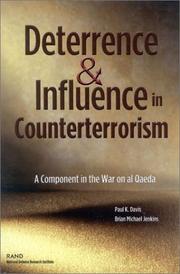| Listing 1 - 10 of 55 | << page >> |
Sort by
|

ISBN: 9781592371143 1592371140 Year: 2006 Publisher: Millerton, N.Y. : Grey House Pub.,
Abstract | Keywords | Export | Availability | Bookmark
 Loading...
Loading...Choose an application
- Reference Manager
- EndNote
- RefWorks (Direct export to RefWorks)
Military history --- Histoire militaire --- Encyclopedias. --- Encyclopédies --- 93 --- Geschiedenis --- Encyclopédies

ISBN: 0833034065 0833032860 9780833034069 9780833032867 Year: 2002 Publisher: Santa Monica, CA : Rand,
Abstract | Keywords | Export | Availability | Bookmark
 Loading...
Loading...Choose an application
- Reference Manager
- EndNote
- RefWorks (Direct export to RefWorks)
Historical experience has shown that successful strategies to combat terrorism that is spawned by serious, deep-rooted problems have involved first crushing the current threat and then bringing about changes to make terrorism?s reemergence less likely. While deterrence of terrorism may at first glance seem to be an unrealistic goal?concepts such as co-optation and inducement cannot be expected to be effective for dealing with terrorists who have the unshakable commitment of an Osama bin Laden?it may be possible to influence some members of terrorist groups. Such groups are not simply single
September 11 Terrorist Attacks, 2001. --- Terrorism. --- Terrorism --- September 11 Terrorist Attacks, 2001 --- Social Welfare & Social Work --- Social Sciences --- Criminology, Penology & Juvenile Delinquency --- Prevention --- Prevention. --- Qaida (Organization) --- -#SBIB:031.GIFT --- #SBIB:327.5H21 --- #SBIB:328H31 --- 9/11 Terrorist Attacks, 2001 --- 911 Terrorist Attacks, 2001 --- Attack on America, 2001 (September 11 Terrorist Attacks) --- Nine-Eleven Terrorist Attacks, 2001 --- Pentagon-World Trade Center Terrorist Attacks, 2001 --- Sept. 11 Terrorist Attacks, 2001 --- September 11 Terror Attacks, 2001 --- September 11 Terrorism, 2001 --- Terrorist Attacks, September 11, 2001 --- World Trade Center-Pentagon Terrorist Attacks, 2001 --- Hijacking of aircraft --- Acts of terrorism --- Attacks, Terrorist --- Global terrorism --- International terrorism --- Political terrorism --- Terror attacks --- Terrorist acts --- Terrorist attacks --- World terrorism --- Direct action --- Insurgency --- Political crimes and offenses --- Subversive activities --- Political violence --- Terror --- Vrede – oorlog, oorlogssituaties --- Instellingen en beleid: VSA / USA --- Qāʻidah (Organization) --- Quaida (Organization) --- Al-Qaida (Organization) --- Qaeda (Organization) --- International Islamic Front for Jihad Against Jews and Crusaders --- Islamic Salvation Foundation --- Group for the Preservation of the Holy Sites --- Islamic Army for the Preservation of Holy Sites --- Islamic Army for the Preservation of the Holy Places --- Al Qaeda (Organization) --- Al Queda (Organization) --- Alʹ-Kaida (Organization) --- Kaida (Organization) --- R̄ekxirawî Elqaʻîde --- Elqaʻîde (Organization) --- تنظيم القاعدة --- قاعدة (منظمة) --- Al-Qaedah (Organization) --- Anti-terrorism --- Antiterrorism --- Counter-terrorism --- Counterterrorism --- #SBIB:031.GIFT
Book
ISBN: 0833083368 083308092X 9780833083364 9780833080929 Year: 2013 Publisher: [Place of publication not identified] : Rand,
Abstract | Keywords | Export | Availability | Bookmark
 Loading...
Loading...Choose an application
- Reference Manager
- EndNote
- RefWorks (Direct export to RefWorks)
Terrorism --- Behavioral assessment --- Psychology --- Violence --- Research --- Behavioral Sciences --- Science --- Crime --- Social Problems --- Behavioral Disciplines and Activities --- Natural Science Disciplines --- Criminology --- Sociology --- Psychiatry and Psychology --- Social Sciences --- Disciplines and Occupations --- Anthropology, Education, Sociology and Social Phenomena --- Behavioral Research --- Social Welfare & Social Work --- Criminology, Penology & Juvenile Delinquency --- Prevention --- Methodology --- Radioactive Terrorism --- Terrorism, Radioactive --- Research, Behavioral --- Science, Social --- Sciences, Social --- Social Science --- General Social Development and Population --- Natural Sciences --- Physical Sciences --- Discipline, Natural Science --- Disciplines, Natural Science --- Natural Science --- Natural Science Discipline --- Physical Science --- Science, Natural --- Science, Physical --- Sciences, Natural --- Sciences, Physical --- Problem, Social --- Problems, Social --- Social Problem --- Kidnapping --- Crimes --- Kidnappings --- Criminal Behavior --- Sciences --- Proxemics --- Behavioral Science --- Proxemic --- Science, Behavioral --- Sciences, Behavioral --- Laboratory Research --- Research Activities --- Research and Development --- Research Priorities --- Activities, Research --- Activity, Research --- Development and Research --- Priorities, Research --- Priority, Research --- Research Activity --- Research Priority --- Research, Laboratory --- Ethics, Research --- Assaultive Behavior --- Atrocities --- Behavior, Assaultive --- Biological Warfare --- Riots --- Warfare --- Crime Victims --- Behavioral sciences --- Mental philosophy --- Mind --- Science, Mental --- Human biology --- Philosophy --- Soul --- Mental health --- Assessment of behavior --- Behavior assessment --- Behavioral analysis --- Behavioral evaluation --- Psychodiagnostics --- Anti-terrorism --- Antiterrorism --- Counter-terrorism --- Counterterrorism --- Labor Exploitation --- Social Exploitation --- Exploitation, Labor --- Exploitation, Social --- Exploitations, Labor --- Poaching --- Structural Violence --- Violence, Structural --- Wildlife Trade --- Interpersonal Violence --- Violent Crime --- Crime, Violent --- Interpersonal Violences --- Violence, Interpersonal --- Violences, Interpersonal --- Violent Crimes --- Occupations --- Vocations --- Occupation --- Vocation --- Occupational Groups --- Factors, Psychological --- Psychological Factors --- Psychological Side Effects --- Psychologists --- Psychosocial Factors --- Side Effects, Psychological --- Factor, Psychological --- Factor, Psychosocial --- Factors, Psychosocial --- Psychological Factor --- Psychological Side Effect --- Psychologist --- Psychosocial Factor --- Side Effect, Psychological --- Violence. --- Research. --- Behavioral Sciences. --- Science. --- Crime. --- Social Problems. --- Behavioral Disciplines and Activities. --- Natural Science Disciplines. --- Criminology. --- Sociology. --- Psychology. --- Social Sciences. --- Occupations. --- Behavioral Research. --- Terrorism. --- Prevention. --- Methodology.
Book
ISBN: 0199986541 0199711755 9780199711758 1299559360 9781299559363 9780195342352 0195342356 Year: 2013 Publisher: New York Oxford University Press
Abstract | Keywords | Export | Availability | Bookmark
 Loading...
Loading...Choose an application
- Reference Manager
- EndNote
- RefWorks (Direct export to RefWorks)
""The personality of a general is indispensable,"" Napoleon once said. ""He is the head, he is the all, of an army."" In Masters of the Battlefield, Paul K. Davis offers vivid portraits of fifteen legendary military leaders whose brilliance on and off the battlefield embody this maxim. Hailing from the earliest days of Greek warfare to France at the turn of the nineteenth century, these men stand out for their tactical abilities--generals who made a difference in combat, grasping the way an enemy would think or move and reacting not just to ensure victory, but do so in the face of superior for
Generals --- Military biography. --- Military art and science --- Military history --- Naval history --- Biography --- War diaries --- History.

ISBN: 0874367824 Year: 1996 Publisher: Santa Barbara, Calif. : ABC-CLIO,
Abstract | Keywords | Export | Availability | Bookmark
 Loading...
Loading...Choose an application
- Reference Manager
- EndNote
- RefWorks (Direct export to RefWorks)
Military history --- Histoire militaire --- Encyclopedias --- Encyclopédies
Book
Year: 2021 Publisher: Santa Monica, Calif. RAND Corporation
Abstract | Keywords | Export | Availability | Bookmark
 Loading...
Loading...Choose an application
- Reference Manager
- EndNote
- RefWorks (Direct export to RefWorks)
In this report, the authors describe an experimental "thinking-Red" approach to analysis, wargaming, and other exercises that may help inform strategies to avoid aggression or escalation in a crisis. This thinking-Red approach focuses on how to influence an adversary's reasoning in ways that the decisionmaker regards as favorable. It does so with alternative models of the adversary. An influence strategy might involve a mix of deterrence by threat of punishment, deterrence by denial, dissuasion by many means, reassurances, and incentives. Deterrent threats alone will seldom constitute effective strategy and, depending on the adversary's motivations and perceptions, could even be counterproductive. A successful strategy will also often require artful orchestration of political, military, and economic instruments of power. The approach can be applied to (1) diverse potential adversaries, (2) both direct and gray-zone conflicts, and (3) different levels of crisis, conflict or competition. Each of the three applications will require an in-depth study of substantive issues and refining methods and tools, but the potential scope of applications is wide.
Book
Year: 2010 Publisher: Santa Monica, CA : RAND Corporation,
Abstract | Keywords | Export | Availability | Bookmark
 Loading...
Loading...Choose an application
- Reference Manager
- EndNote
- RefWorks (Direct export to RefWorks)
A concern within the Air Force is that headquarters-level program decisions sometimes fail to give sufficient priority to requests important to meeting warfighter needs. This technical report documents a phase-one effort to develop new methods to help ensure that warfighter needs are adequately represented as the Air Force manages its programs and budget. Drawing on previous RAND work on capabilities-based planning and portfolio management, the authors outline a method that considers measures of combat effectiveness, as well as cost-effectiveness from multiple perspectives, to compare composite options--that is, options involving multiple platforms and capabilities--for accomplishing a given mission. The authors illustrate the method by applying it to the mission of close air support, using notional data.
Close air support. --- United States. --- Management. --- Planning. --- Combat sustainability. --- Operational readiness.
Book
Year: 2012 Publisher: Santa Monica, CA : ©2012 RAND Corporation,
Abstract | Keywords | Export | Availability | Bookmark
 Loading...
Loading...Choose an application
- Reference Manager
- EndNote
- RefWorks (Direct export to RefWorks)
A first step in dealing with uncertainty is confronting its existence, ubiquity, and magnitude. A second step is dealing with it when informing assessments and decisions. As the Cold War waned, RAND developed new methods that urged sketching the no-surprises future, listing known branch-style uncertainties, and stretching the imagination to envision potential shocks, good or bad (e.g., Soviet Union disintegration or Saddam Hussein's invasion of Kuwait). Major surprises will nonetheless occur, and some of RAND's most important work on uncertainty has to do with coping with surprise developments. RAND's progress in national security uncertainty analysis benefited from a confluence of developments in computer and software technology, theory and practice in strategic planning and decisionmaking, analytic theory and methods, and theory of complex adaptive systems. Work has emphasized facing up to deep uncertainty in many dimensions, performing exploratory analysis of "the possibility space," identifying regions of that space that pose special risks or opportunities, finding options to improve capabilities, and using portfolio analysis to conceive and compare strategic options for economically dealing with the diversity of challenges. A cross-cutting RAND theme is finding flexible, adaptive, and robust (FAR) strategies. Ultimately, different problems call for different approaches to uncertainty. If the theory of planning under uncertainty and preparing to cope with surprise effectively is difficult and complex, this report makes clear that implementing and maintaining corresponding changes is even more difficult and suggests that policymakers to be constantly vigilant in ensuring that related initiatives are not undercut or allowed to wither.
National security --- Interagency coordination --- Strategic planning --- System analysis. --- Planning.
Book
Year: 1994 Publisher: Santa Monica, CA : RAND Corporation,
Abstract | Keywords | Export | Availability | Bookmark
 Loading...
Loading...Choose an application
- Reference Manager
- EndNote
- RefWorks (Direct export to RefWorks)
This book is a collection of essays by senior defense analysts at RAND, all of whom have been deeply involved in post-Cold War defense planning studies for the Department of Defense. The essays cover a wide spectrum of issues, including alternative strategies and structures for defense planning, conventional deterrence of Third World opponents, modernizing weapon systems and force structures, and planning under uncertainty (a major theme of the book as a whole). Some of the essays are sympathetic to current U.S. methods and policies, whereas others are critical, arguing that radical changes are needed. Taken as a whole, the book provides a provocative cross section of work by experts who understand both the theoretical issues and the practical considerations that the Department of Defense must address. The book will be of interest to policymakers, students of defense planning, and other readers seeking to understand the challenges and choices confronting defense planners as we approach the end of the century.
Military planning --- World politics --- United States --- Military policy.
Book
ISBN: 0833009516 Year: 1988 Publisher: Santa Monica Rand Corporation
Abstract | Keywords | Export | Availability | Bookmark
 Loading...
Loading...Choose an application
- Reference Manager
- EndNote
- RefWorks (Direct export to RefWorks)
| Listing 1 - 10 of 55 | << page >> |
Sort by
|

 Search
Search Feedback
Feedback About UniCat
About UniCat  Help
Help News
News